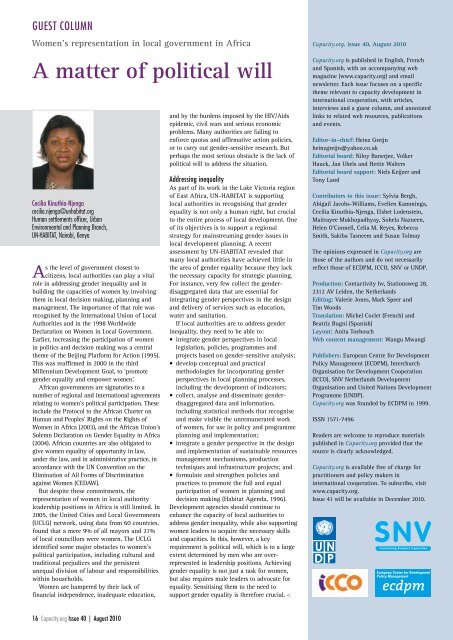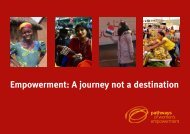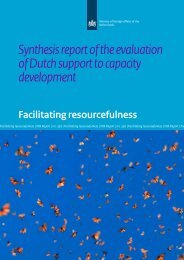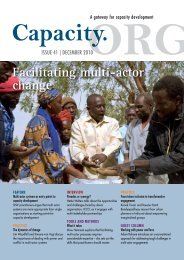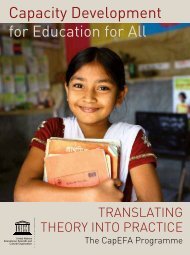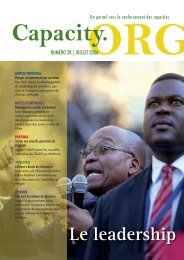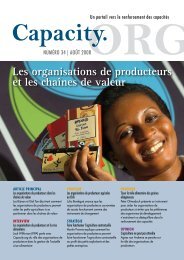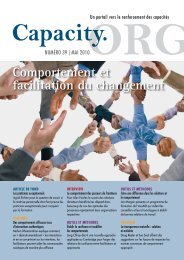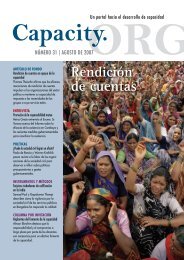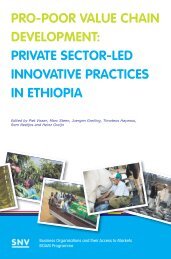Download Local Government For Gender Equality
Download Local Government For Gender Equality
Download Local Government For Gender Equality
You also want an ePaper? Increase the reach of your titles
YUMPU automatically turns print PDFs into web optimized ePapers that Google loves.
guest columnWomen’s representation in local government in AfricaA matter of political willCecilia Kinuthia-Njengacecilia.njenga@unhabitat.orgHuman settlements officer, UrbanEnvironmental and Planning Branch,UN-HABITAT, Nairobi, KenyaAs the level of government closest tocitizens, local authorities can play a vitalrole in addressing gender inequality and inbuilding the capacities of women by involvingthem in local decision making, planning andmanagement. The importance of that role wasrecognised by the International Union of <strong>Local</strong>Authorities and in the 1998 WorldwideDeclaration on Women in <strong>Local</strong> <strong>Government</strong>.Earlier, increasing the participation of womenin politics and decision making was a centraltheme of the Beijing Platform for Action (1995).This was reaffirmed in 2000 in the thirdMillennium Development Goal, to ‘promotegender equality and empower women’.African governments are signatories to anumber of regional and international agreementsrelating to women’s political participation. Theseinclude the Protocol to the African Charter onHuman and Peoples’ Rights on the Rights ofWomen in Africa (2003), and the African Union’sSolemn Declaration on <strong>Gender</strong> <strong>Equality</strong> in Africa(2004). African countries are also obligated togive women equality of opportunity in law,under the law, and in administrative practice, inaccordance with the UN Convention on theElimination of All <strong>For</strong>ms of Discriminationagainst Women (CEDAW).But despite these commitments, therepresentation of women in local authorityleadership positions in Africa is still limited. In2005, the United Cities and <strong>Local</strong> <strong>Government</strong>s(UCLG) network, using data from 60 countries,found that a mere 9% of all mayors and 21%of local councillors were women. The UCLGidentified some major obstacles to women’spolitical participation, including cultural andtraditional prejudices and the persistentunequal division of labour and responsibilitieswithin households.Women are hampered by their lack offinancial independence, inadequate education,and by the burdens imposed by the HIV/Aidsepidemic, civil wars and serious economicproblems. Many authorities are failing toenforce quotas and affirmative action policies,or to carry out gender-sensitive research. Butperhaps the most serious obstacle is the lack ofpolitical will to address the situation.Addressing inequalityAs part of its work in the Lake Victoria regionof East Africa, UN-HABITAT is supportinglocal authorities in recognising that genderequality is not only a human right, but crucialto the entire process of local development. Oneof its objectives is to support a regionalstrategy for mainstreaming gender issues inlocal development planning. A recentassessment by UN-HABITAT revealed thatmany local authorities have achieved little inthe area of gender equality because they lackthe necessary capacity for strategic planning.<strong>For</strong> instance, very few collect the genderdisaggregateddata that are essential forintegrating gender perspectives in the designand delivery of services such as education,water and sanitation.If local authorities are to address genderinequality, they need to be able to:• integrate gender perspectives in locallegislation, policies, programmes andprojects based on gender-sensitive analysis;• develop conceptual and practicalmethodologies for incorporating genderperspectives in local planning processes,including the development of indicators;• collect, analyse and disseminate genderdisaggregateddata and information,including statistical methods that recogniseand make visible the unremunerated workof women, for use in policy and programmeplanning and implementation;• integrate a gender perspective in the designand implementation of sustainable resourcesmanagement mechanisms, productiontechniques and infrastructure projects; and• formulate and strengthen policies andpractices to promote the full and equalparticipation of women in planning anddecision making (Habitat Agenda, 1996).Development agencies should continue toenhance the capacity of local authorities toaddress gender inequality, while also supportingwomen leaders to acquire the necessary skillsand capacities. In this, however, a keyrequirement is political will, which is to a largeextent determined by men who are overrepresentedin leadership positions. Achievinggender equality is not just a task for women,but also requires male leaders to advocate forequality. Sensitising them to the need tosupport gender equality is therefore crucial.


